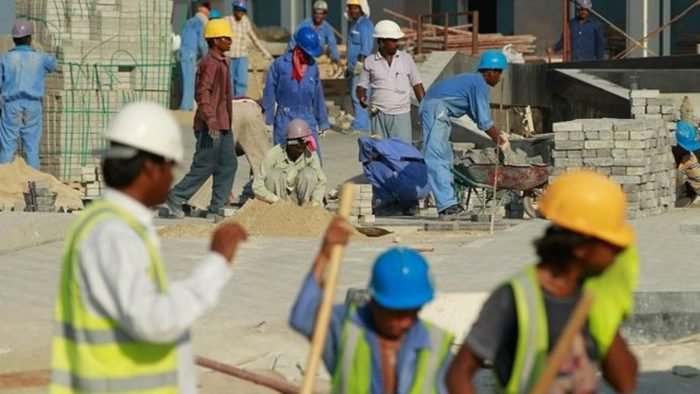Kuwait outdoor work ban has officially started for summer 2025. The country has announced that outdoor labor will not be allowed from 11am to 4pm, starting June 1 and lasting until August 31. The decision is part of Kuwait’s ongoing efforts to protect workers from dangerous summer heat.
The Public Authority for Manpower made the announcement and confirmed that the goal is to prevent heat-related illnesses and ensure worker safety in extreme temperatures. This annual regulation, which has been in place for years, reflects the growing concern over the health impacts of climate change and rising temperatures in the Gulf.
Why Kuwait introduced the outdoor work ban
Kuwait is one of the hottest countries in the world during summer. Temperatures often rise above 50°C (122°F), creating unsafe working conditions, especially for outdoor laborers such as construction workers, cleaners, and landscapers.

Many of these workers come from South Asian countries and work long hours under the sun. Without proper protection and breaks, the risk of heat stroke, dehydration, and exhaustion becomes extremely high.
The government believes that this Kuwait outdoor work ban is necessary to save lives and reduce medical emergencies during the hottest part of the day.
When and where the ban applies
The ban applies nationwide in all workplaces involving outdoor labor. From June 1 to August 31, employers are not allowed to make workers do outdoor jobs from 11am to 4pm.
This includes:
- Construction sites
- Street maintenance
- Landscaping and gardening
- Outdoor cleaning services
- Any open-air work activity
It is the employer’s responsibility to ensure compliance. If businesses break the rule, they can face serious penalties, including fines and possible closure.
How authorities will enforce the ban
The Public Authority for Manpower (PAM) will conduct regular inspections across Kuwait during the summer months. Inspectors will visit sites during the banned hours to make sure companies are following the rule.
The government has also set up a hotline and encourages the public to report any violations. Anonymous tips from citizens, workers, or other businesses can help ensure compliance across all sectors.
Companies caught breaking the rule may:
- Receive financial fines
- Be listed as violating safety rules
- Lose licenses or permits
- Face temporary or permanent shutdowns
What employers need to do now
All employers involved in outdoor activities are expected to:
- Rearrange work hours to avoid the banned period
- Educate workers about heat risks and safe practices
- Provide shaded rest areas and clean drinking water
- Monitor employees for signs of heat exhaustion
The Kuwait outdoor work ban is not only about following the law—it’s also about treating workers with dignity and ensuring a safe working environment.
Worker safety takes priority in extreme heat

Heat-related illness is a serious threat. According to medical experts, symptoms of heat stroke and dehydration can set in quickly under direct sunlight, especially when physical labor is involved.
Common symptoms include:
- Headaches
- Nausea
- Dizziness
- Fainting
- Muscle cramps
- High body temperature
Employers are urged to be proactive in keeping their workers safe. Providing training in basic first aid and ensuring rapid access to medical help if needed is part of a responsible business operation.
Global spotlight on worker safety in the Gulf
Kuwait is not alone in taking action. Other Gulf countries such as UAE, Qatar, and Saudi Arabia have similar bans or guidelines in place during summer months.
In fact, Kuwait’s decision to strictly enforce the outdoor work ban reflects a wider push across the region to improve labor standards and align with international human rights expectations.
Global organizations like the International Labour Organization (ILO) have praised such efforts, especially in regions facing climate extremes.
Climate change makes this ban more urgent than ever
Climate experts say that heatwaves are becoming more frequent and severe due to climate change. In the Middle East, the impact is especially intense because of the dry desert climate.
Kuwait has already experienced record-breaking temperatures in the past decade. In 2021, the country recorded a high of 53.2°C, making it one of the hottest places on Earth.
This trend has forced policymakers to consider health and climate safety together. The Kuwait outdoor work ban is one response to this challenge.
Support for the ban from human rights and worker groups
Worker advocacy groups and human rights organizations have praised Kuwait’s decision. Many have long pushed for better labor protections, especially for low-income migrant workers who often face tough conditions.
A spokesperson from a local NGO working with migrant laborers said:
“This ban is essential. Every summer we see people collapsing from heat. It’s good to see the government taking this seriously.”
Social media users also welcomed the move, with many calling it a step forward for human dignity.
What happens if the ban is ignored?

Ignoring the Kuwait outdoor work ban is not just a legal risk—it’s a human risk. Companies that violate the rule put their workers’ lives in danger.
Past violations have led to:
- Worker hospitalizations
- Deaths from heatstroke
- Public outcry and bad publicity
The Kuwaiti government is sending a clear message: worker health is not negotiable.
Conclusion: A timely move to save lives this summer
The Kuwait outdoor work ban is more than a policy—it’s a commitment to protecting those who build and maintain the country under harsh conditions.
As temperatures soar this summer, ensuring safety, dignity, and health for every worker must remain a top priority. The ban is a necessary and humane measure to prevent avoidable tragedies and promote a more caring, responsible work culture in Kuwait.
Read More: Saudi Residency And Labour Arrests Cross 12,000 in a Week













